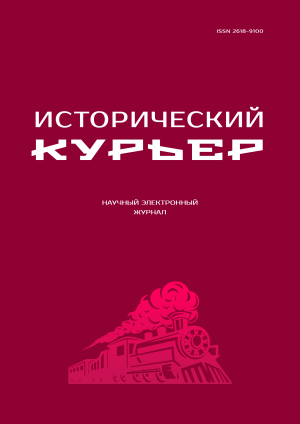Soviet Electoral System: Institutions, Mechanisms, Electoral Behavior of the Population (1917-1991)
The topic of this issue is devoted to a very difficult subject area in Russian historical science, related to the sphere of relationship between the institutions of power and society in the Soviet era. Despite the apparent obviousness of the role and significance of electivity as an institution that continuously ensured and confirmed the legitimation of the Soviet state and its unshakable mass support by the population of the country, difficulties, conflicts and contradictions nevertheless arose within the electoral process itself, which occasionally took crisis forms and were preventively “extinguished” actions of party and government bodies. They manifested themselves quite clearly in the first early Soviet period, until the end of the 1920s, but then the electoral space turned out to be extremely cleared under the cover of the “inviolability of the bloc of communists and non-party members,” turning into a ritual action on the part of both the election organizers and the electorate itself. This ritualism operated uninterruptedly until the elections to the Supreme Soviet of the USSR in 1989, which for the first time since the 1917 elections to the Constituent Assembly were, albeit inconsistent, but alternative and competitive in nature.
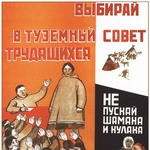 Elections and Electoral Systems
Elections and Electoral Systems
M.S. Salamatova
Electoral Corps of Soviet Cities: Problems of Social Identification and Reflection in Electoral Statistics of the 1920s
The article analyzes the number and structure of the urban electoral corps of the 1920s, determines the ratio with the social structure of society reflected in the censuses of 1923 and 1926, identifies the reasons for the low reliability of electoral statistics. Analysis of census data and electoral statistics showed significant discrepancies. The reasons for the distortion of electoral statistics were the artificial construction of the electoral corps, changes in the criteria for accounting for various groups of voters and pressure on the election organizers to achieve high rates of participation of the proletarian layers.
Publishing: 28/02/2024
How to cite: Salamatova M.S. Electoral Corps of Soviet Cities: Problems of Social Identification and Reflection in Electoral Statistics of the 1920s // Historical Courier, 2024, No. 1 (33), pp. 11–24. [Available online: http://istkurier.ru/data/2024/ISTKURIER-2024-1-01.pdf]
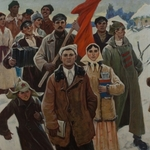 Elections and Electoral Systems
Elections and Electoral Systems
L.V. Kromer
Participation of the Komsomol in Elections to Village Councils in Siberia in the 1920s
The article is dedicated to Komsomol participation in village soviets elections in 1920s. The author has revealed, how percentage of Komsomol representatives was changed after electoral campaigns and which circumstances influenced this changes. By results of research conclusion may be made, that during 1920s Komsomol role in elections became more and more visible: since 1924 it massively participated the election and since 1925 any time increased its representation in village soviets, due to improvement of quality of work with electors and administrative pressure as well.
Publishing: 28/02/2024
How to cite: Kromer L.V. Participation of the Komsomol in Elections to Village Councils in Siberia in the 1920s // Historical Courier, 2024, No. 1 (33), pp. 25–35. [Available online: http://istkurier.ru/data/2024/ISTKURIER-2024-1-02.pdf]
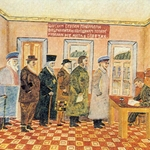 Elections and Electoral Systems
Elections and Electoral Systems
V.А. Ilinykh
Elections to the Soviets in the RSFSR under the Conditions of the NEP: Features and Results of Election Campaigns in 1922–1929
The article considers the functioning of the Soviet electoral system under the conditions of the NEP. For this purpose, a detailed analysis of the conduct of election campaigns to city and rural soviets in the RSFSR in 1922–1929 was carried out. The author identified the changes in the election law and electoral practices, the peculiarities of the behavior of various social groups during elections, the quantitative results of campaigns. Three main stages of the development of the electoral system in the study period were revealed. In the early 1920s anti-democratic election practices prevailed. It is concluded that the changes in the composition of the soviets that took place by 1930 were an indicator of the curtailment of the NEP that began on the initiative “from above”. Rural soviets and district executive committees, from which persons undesirable to the authorities were eliminated, turned into reliable conductors of the agrarian policy of the Bolshevik Party and actively involved in forced collectivization and dekulakization. Deputies of city soviets and members of higher executive committees were also ready for “the great break”.
Publishing: 28/02/2024
How to cite: Il’inykh V.А. Elections to the Soviets in the RSFSR under the Conditions of the NEP: Features and Results of Election Campaigns in 1922–1929 // Historical Courier, 2024, No. 1 (33), pp. 36–48. [Available online: http://istkurier.ru/data/2024/ISTKURIER-2024-1-03.pdf]
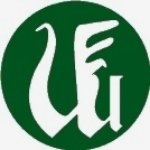 Elections and Electoral Systems
Elections and Electoral Systems
T.I. Morozova
“Granting… the Rights of Broad Democracy” or “a Certain Maneuver of the Communists”? Re-elections of Rural Councils in Siberia (October 1924 – March 1925)
The article is devoted to the elections to village councils held in Siberia from October 1924 to March 1925. This election campaign became one of the most extraordinary in the years of the new economic policy, since it combined three multidirectional processes: primary elections to village councils, the abolition of their results in certain districts of the RSFSR and the holding of extraordinary re-elections there. The author put forward a new point of view regarding the reasons for the cassation, found out how the extraordinary re-elections were perceived by the local population and how they influenced the quantitative and qualitative composition of the village councils of Siberia.
Publishing: 28/02/2024
How to cite: Morozova T.I. “Granting… the Rights of Broad Democracy” or “a Certain Maneuver of the Communists”? Re-elections of Rural Councils in Siberia (October 1924 – March 1925) // Historical Courier, 2024, No. 1 (33), pp. 49–63. [Available online: http://istkurier.ru/data/2024/ISTKURIER-2024-1-04.pdf]
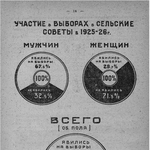 Elections and Electoral Systems
Elections and Electoral Systems
N.N. Ablazhey, A.S. Zhanbossinova
“The Situation is Stable”: Elections to Soviets in the Akmola Province of 1926/1927
The document presented in this paper is the final report of the Akmola provincial executive committee on the organization, progress and results of the 1926/1927 election campaign to local soviets. The document was deposited in the fund of the Central Executive Committee of Soviets of the Kazakh Autonomous Soviet Socialist Republic in the Central State Archives of the Republic of Kazakhstan. The report is an analytical report on the organization and progress of the election campaign, which included several stages, namely, setting the election date, forming election commissions, holding reporting plenums of the previous councils, reporting to the population, pre-election campaigning, voting and determining the results. The document contains a detailed version of reporting with aggregated election statistics.
Publishing: 28/02/2024
How to cite: Ablazhey N.N., Zhanbossinova A.S. “The Situation is Stable”: Elections to Soviets in the Akmola Province of 1926/1927 // Historical Courier, 2024, No. 1 (33), pp. 11–91. [Available online: http://istkurier.ru/data/2024/ISTKURIER-2024-1-05.pdf]
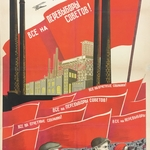 Elections and Electoral Systems
Elections and Electoral Systems
E.A. Ignat’eva
The Campaign 1928/1929 Soviet Union Legislative Re-Election in Evaluation by Party Organization of Siberia
The published materials reflect the evaluation by party organization Siberia the campaign 1928/1929 Soviet Union legislative re-election. The published document evaluates the specifics of the internal review and analysis of the campaign by the party institutes. The main focus of the document was on reviewing the actions of primary party cells in urban and rural areas. The dominant role of local party cells over the Soviets during the campaign was emphasized. The general conclusions in the “Review” contained a statement of the main trend – the re-election campaign was marked by the strengthening of the position of Communists in the leadership of Soviets at all levels. The “Review” clearly distorted the emphasis of the causes of the situation (the reality corresponding to ideological doctrines was constructed).
Publishing: 28/02/2024
How to cite: Ignat’eva E.A. The Campaign 1928/1929 Soviet Union Legislative Re-Election in Evaluation by Party Organization of Siberia // Historical Courier, 2024, No. 1 (33), pp. 92–118. [Available online: http://istkurier.ru/data/2024/ISTKURIER-2024-1-06.pdf]
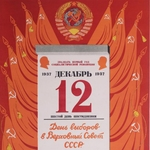 Elections and Electoral Systems
Elections and Electoral Systems
S.A. Papkov
Peculiarities and Paradoxes of the 1937 Election Campaign
The publication presents an analysis of the election campaign for the elections to the Supreme Soviet of the USSR, in which for the first time it was planned to use democratic procedures of universal participation of citizens, free nomination of candidates and secret ballot as a condition for expanding the social base of Soviet power. It is noted that in practice, these principled guidelines came into deep contradiction with the existing realities. In preparing for the elections, the Stalinist leadership had to face unexpected reactions of the population and complications within the Bolshevik Party itself. It is concluded that the fear of losing control of the upcoming vote and the growing discontent within the party apparatus forced Stalin to completely change the election scenario. It is also shown what connection the preparations for the elections had with the mass terrorist operations of the NKVD in 1937.
Publishing: 28/02/2024
How to cite: Papkov S.A. Peculiarities and Paradoxes of the 1937 Election Campaign // Historical Courier, 2024, No. 1 (33), pp. 119–129. [Available online: http://istkurier.ru/data/2024/ISTKURIER-2024-1-07.pdf]
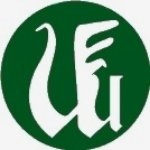 Elections and Electoral Systems
Elections and Electoral Systems
A.A. Fokin
“This is Not a Legal Requirement, but an Established Tradition,” or Why There was Only One Candidate on the Soviet Ballot Paper
The peculiarity of the late Soviet period lies in the transformation of the relationship between the institutions of power and various groups of the population. The institution of elections was one of the mechanisms of this “feedback”, which served to strengthen trust between the authorities and society. One of the hidden functions of the electoral process in the USSR was to maintain or strengthen trust in the existing system through repetitive rituals. The potential use of elections as a mechanism to “purge” the nomenklatura by relying on the vox populi may explain one aspect of the Soviet electoral process that perplexed Soviet citizens as well. Documents from the archives show that citizens regarded letters to the authorities as an effective way to communicate with them and an opportunity to solve their problems. The majority of the population actively participated in the ideological campaign, which called for the defence of Soviet norms and values. At the same time, their ideas about morality were often stricter than the official ones.
Publishing: 28/02/2024
How to cite: Fokin A.A. “This is Not a Legal Requirement, but an Established Tradition,” or Why There was Only One Candidate on the Soviet Ballot Paper // Historical Courier, 2024, No. 1 (33), pp. 130–138. [Available online: http://istkurier.ru/data/2024/ISTKURIER-2024-1-08.pdf]
 Electorate and Non-Electorate
Electorate and Non-Electorate
D.N. Moskalenskaya
Disenfranchised in Post-Soviet Russian Historiography
The article examines the development of the study of the topic of deprivation of voting rights in Soviet Russia in Russian historiography of the post-Soviet period. Since the beginning of the 1990s, when this topic began to be studied from new evaluative positions, a large number of diverse studies have appeared on the “disenfranchised”. Some of the authors study legislation in the field of electoral law and its implementation in practice. Others have focused their attention on the socio-cultural appearance of the “disenfranchised”, exploring their individual categories, and identifying the specifics of the situation of various groups. Representatives of the third direction shift the emphasis to the study of personal documents of persons deprived of voting rights, studying speech practices, drawing up a psychological portrait of the petitioners.
Publishing: 28/02/2024
How to cite: Moskalenskaya D.N. Disenfranchised in Post-Soviet Russian Historiography // Historical Courier, 2024, No. 1 (33), pp. 139–154. [Available online: http://istkurier.ru/data/2024/ISTKURIER-2024-1-09.pdf]
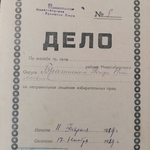 Electorate and Non-Electorate
Electorate and Non-Electorate
A.A. Kozhaeva
Social and Legal Discrimination in the Perception of Persons Deprived of Voting Rights in Novosibirsk (1925–1936)
The Constitution of the RSFSR was adopted by the V All-Russian Congress of Soviets in July 1918. It defined categories of individuals who were deprived of the right to actively or passively take part in elections. By the second half of the 1920s, the campaign of “disenfranchisement” was finally formalized and had a significant impact on individuals who were on discriminatory lists. This article focuses on examining the perception of persons deprived of voting rights in Novosibirsk of their own status after discrimination. Based on the analysis of petitions for the restoration of the rights, the mechanisms of the “disenfranchisement” are reconstructed from the perspective of the direct participants in those events. The reactions of petitioners to the deprivation of their voting rights are identified. Additionally, the discriminatory restrictions in the everyday lives of persons deprived of voting rights are determined. These restrictions were described in the petitions for the restoration of the rights. Therefore, conclusions about the extent to which electoral discrimination influenced the status of persons deprived of voting rights in post-revolutionary society are drawn.
Publishing: 28/02/2024
How to cite: Kozhaeva A.A. Social and Legal Discrimination in the Perception of Persons Deprived of Voting Rights in Novosibirsk (1925–1936) // Historical Courier, 2024, No. 1 (33), pp. 155–165. [Available online: http://istkurier.ru/data/2024/ISTKURIER-2024-1-10.pdf]
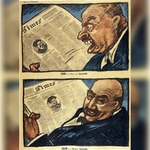 Electorate and Non-Electorate
Electorate and Non-Electorate
P.E. Dobrachev
Disgraced Nobles: Protest of Exiled Bolshevik Oppositionists during the Re-Election Campaign of 1928–1929 in Siberia
The article explores the protest actions of the Bolshevik oppositionists during the re-election campaign to the Soviets in 1928–1929. The XV Congress of the All-Union Communist Party (Bolsheviks) condemned the left deviation, and as a consequence, Trotskyism. A classification of protest actions of oppositionists in relation to the election campaign was carried out and their characteristics were identified. In the historiographical context, the stated topic has until now been considered in passing: the topic was mentioned within the framework of the study of Siberian exile in the 1920s, the history of the Trotskyist movement, the history of the election campaign of 1928–1929, political repressions in Siberia in the 1920s. We have identified the main centers of opposition protest. The article raises the question of the spontaneity of Trotskyist actions and the possibility of coordination between colonies of exiled oppositionists. The author revealed the relationship of the Bolshevik oppositionists with the category of deprived people, their similarities in methods of protest and differences in the goals that prompted it.
Publishing: 28/02/2024
How to cite: Dobrachev P.E. Disgraced Nobles: Protest of Exiled Bolshevik Oppositionists during the Re-Election Campaign of 1928–1929 in Siberia // Historical Courier, 2024, No. 1 (33), pp. 166–175. [Available online: http://istkurier.ru/data/2024/ISTKURIER-2024-1-11.pdf]
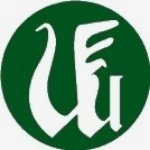 Electorate and Non-Electorate
Electorate and Non-Electorate
M.Yu. Shmatov
Electoral Behavior in Western Siberia (1937–1938): An Anthropological Dimension
The article considers various variants of the electoral behavior of Soviet citizens in Western Siberia during the election campaigns of 1937–1938. The Soviet electorality is analyzed as one of the instruments of social mobilization and legitimization of the party state. The conclusion is made about the relationship of age, gender, territory of residence and social experience of citizens with their behavioral strategies during political campaigns. The social portrait of citizens loyal and critical of the political practices of the Bolsheviks has been revealed.
Publishing: 28/02/2024
How to cite: Shmatov M.Yu. Electoral Behavior in Western Siberia (1937–1938): An Anthropological Dimension // Historical Courier, 2024, No. 1 (33), pp. 176–186. [Available online: http://istkurier.ru/data/2024/ISTKURIER-2024-1-12.pdf]
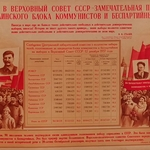 Electorate and Non-Electorate
Electorate and Non-Electorate
A.T. Kazbekova
The Reaction of Exiled Chechens to the Elections to the Supreme Soviet of the USSR
The documentary publication and its accompanying article are dedicated to the reaction of special settlers to the 1946 elections to the Supreme Soviet of the USSR. The published documents allow for the reconstruction of the electoral campaign and the sentiments of the special settlers regarding the elections. The main focus is on analyzing the moods and expectations among the Chechens exiled to Kazakhstan. The new election procedure provided for the special contingent to vote on equal terms with the civilian population. The documentary compilation includes three report notes on the progress of the electoral campaign for the elections to the Supreme Soviet of the USSR among the special settlers of the East Kazakhstan Region of the Kazakh SSR. The first note is a report from the regional Department of the People's Commissariat of Internal Affairs addressed to the republican People's Commissariat of Internal Affairs (NKVD), while the other two are from the instructional department of the regional Committee to the instructional department of the Central Committee of the Communist Party of Kazakhstan. The documents are archived in the State Archive of the East Kazakhstan Region of the Republic of Kazakhstan.
Publishing: 28/02/2024
How to cite: Kazbekova A.T. The Reaction of Exiled Chechens to the Elections to the Supreme Soviet of the USSR // Historical Courier, 2024, No. 1 (33), pp. 187–200. [Available online: http://istkurier.ru/data/2024/ISTKURIER-2024-1-13.pdf]
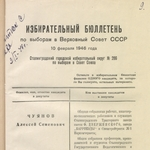 Electorate and Non-Electorate
Electorate and Non-Electorate
O.V. Filippenko
Special Settlers in the Elections of 1946/1947
This article analyzes typical behavioral patterns used by Western Siberian special settlers during their participation in the 1946 Soviet Union Supreme Soviet and 1947 RSFSR Supreme Soviet elections (demonstrative activism, conformity, protest). The author concludes that the elections were a ritual in which not only special settlers but also representatives of the authorities participated. The former were ready to participate in government performances, avoiding extreme forms of activism and protest, while the latter confirmed their loyalty, outwardly demonstrating their maximum interest in achieving party goals. The above allowed the author to present the process of adaptation and integration of discriminated groups into Soviet society as a school of conformity.
Publishing: 28/02/2024
How to cite: Filippenko O.V. Special Settlers in the Elections of 1946/1947 // Historical Courier, 2024, No. 1 (33), pp. 201–213. [Available online: http://istkurier.ru/data/2024/ISTKURIER-2024-1-14.pdf]
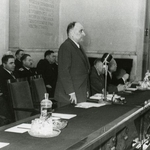 Departmental Elections
Departmental Elections
N.A. Kupershtokh
The First Elections of Members of the USSR Academy of Sciences for the Siberian Branch in 1958 in Documentary Reflection
The article presents documents identified in the Russian State Archive of Contemporary History. The first document is information to the Central Committee of the CPSU from the leaders of the USSR Academy of Sciences about the past elections of academicians and corresponding members for the Siberian Branch of the USSR Academy of Sciences in 1958. The second document is a memorandum from the leadership of the relevant department of the CPSU Central Committee to the higher authority of the Central Committee with comments on a number of issues of the past elections in the Academy of Sciences. Documentary content reveals the algorithm for the first elections of members of the USSR Academy of Sciences for the Siberian Branch in 1958.
Publishing: 28/02/2024
How to cite: Kupershtokh N.A. The First Elections of Members of the USSR Academy of Sciences for the Siberian Branch in 1958 in Documentary Reflection // Historical Courier, 2024, No. 1 (33), pp. 214–226. [Available online: http://istkurier.ru/data/2024/ISTKURIER-2024-1-15.pdf]
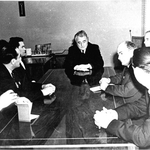 Departmental Elections
Departmental Elections
V.A. Vybornova
Formation of Electoral Practice in the Academic Council of Novosibirsk State University (1959–1963)
Based on the analysis of protocols and transcripts of the first impact of the Scientist of Novosibirsk Soviet University Doctor 1959–1963. The dynamics are shown, revealing its functionality and the division of some elected legal meetings by the faculty council. The peculiarities of the formation of the teaching staff through the electoral practice of the Academic Council, the characteristics of the characteristics of promising candidates, the order of the election process.
Publishing: 28/02/2024
How to cite: Vybornova V.A. Formation of Electoral Practice in the Academic Council of Novosibirsk State University (1959–1963) // Historical Courier, 2024, No. 1 (33), pp. 227–237. [Available online: http://istkurier.ru/data/2024/ISTKURIER-2024-1-16.pdf]
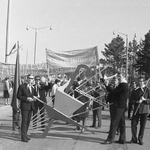 Departmental Elections
Departmental Elections
D.I. Murenko
Komsomol of Novosibirsk Akademgorodok and Socio-Political Aspects of Electoral Processes in Oral Historical Sources (1958–1965)
The phenomenon of electoral behavior of Komsomol youth of Novosibirsk Akademgorodok during its formation is considered through the prism of oral history. Using the example of several interviews, the socio-political aspects (social conflicts, ideological guidelines, political “differences of opinion”) of electoral processes at the level of Komsomol organizations of the scientific center were reconstructed. Oral narratives describe the process of electoral institutionalization of Komsomol structures – the Soviet district committee of the Komsomol and the Komsomol committee of the Siberian Branch of the Academy of Sciences.
Publishing: 28/02/2024
How to cite: Murenko D.I. Komsomol of Novosibirsk Akademgorodok and Socio-Political Aspects of Electoral Processes in Oral Historical Sources (1958–1965) // Historical Courier, 2024, No. 1 (33), pp. 238–250. [Available online: http://istkurier.ru/data/2024/ISTKURIER-2024-1-17.pdf]
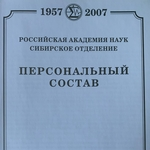 Departmental Elections
Departmental Elections
S.A. Krasilnikov
Personal Composition of Members of the USSR Academy of Sciences – RAS in the Siberian Branch: Election as Recognition (1958–2007)
In the publication, based on the generated database, when processing the created standard biograms of these scientists, a historical and statistical analysis was carried out, which made it possible to determine the main characteristics of the mechanism for replenishing members of the Branch in 1958–2007. The identification of two phases in it (“passionary” and “evolutionary”) is substantiated, during which the initially existing variety of external and internal sources of replenishment of members of the Branch was gradually replaced by sources of elite reproduction on its own personnel basis. This entailed a certain decrease in the vertical career mobility of the regional scientific elite.
Publishing: 28/02/2024
How to cite: Krasilnikov S.A. Personal Composition of Members of the USSR Academy of Sciences – RAS in the Siberian Branch: Election as Recognition (1958–2007) // Historical Courier, 2024, No. 1 (33), pp. 251–264. [Available online: http://istkurier.ru/data/2024/ISTKURIER-2024-1-18.pdf]



